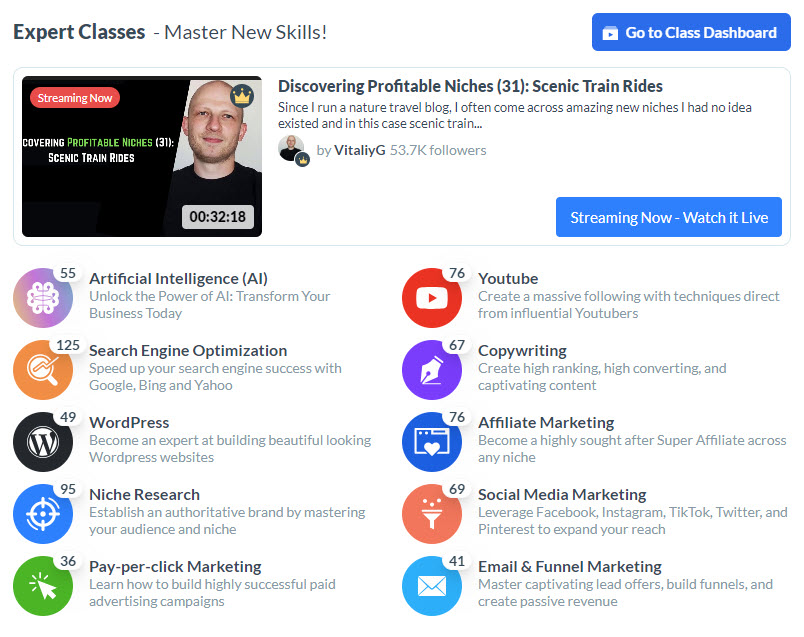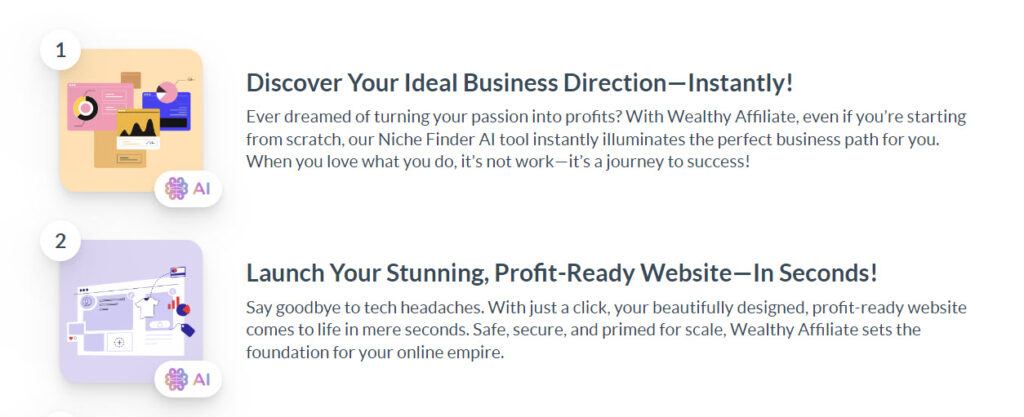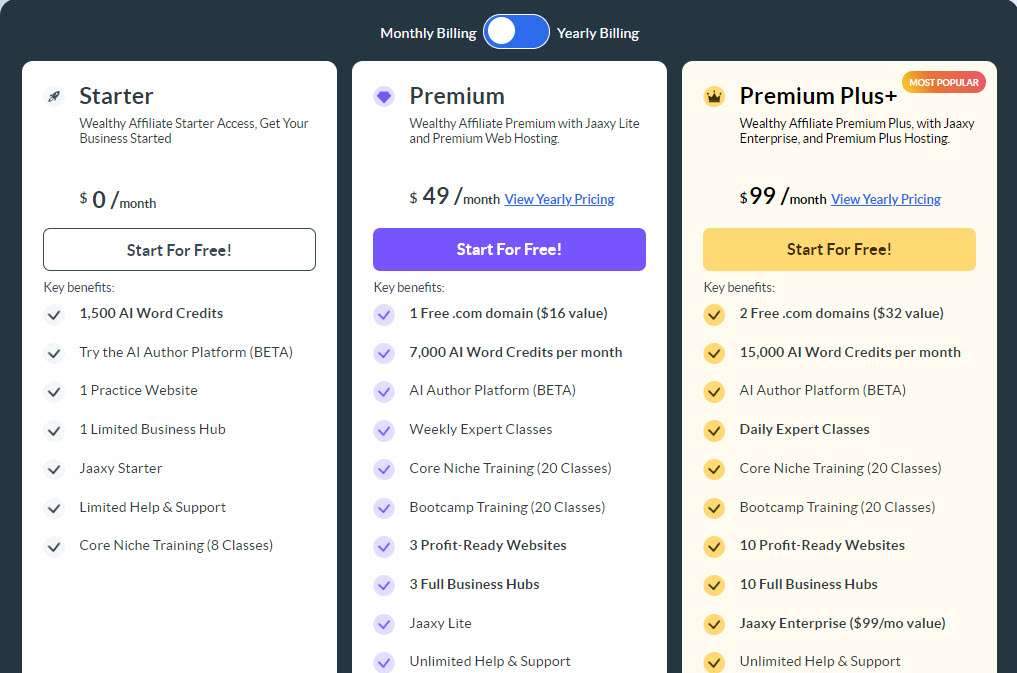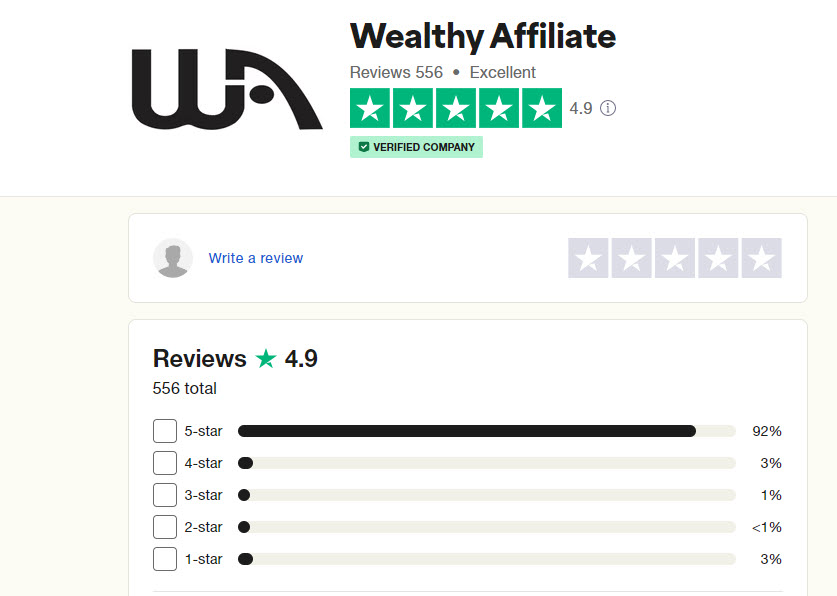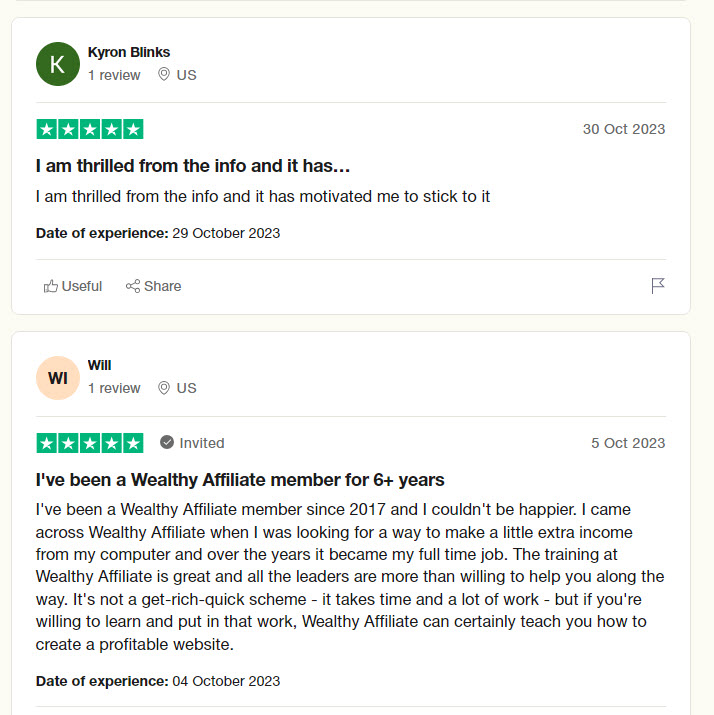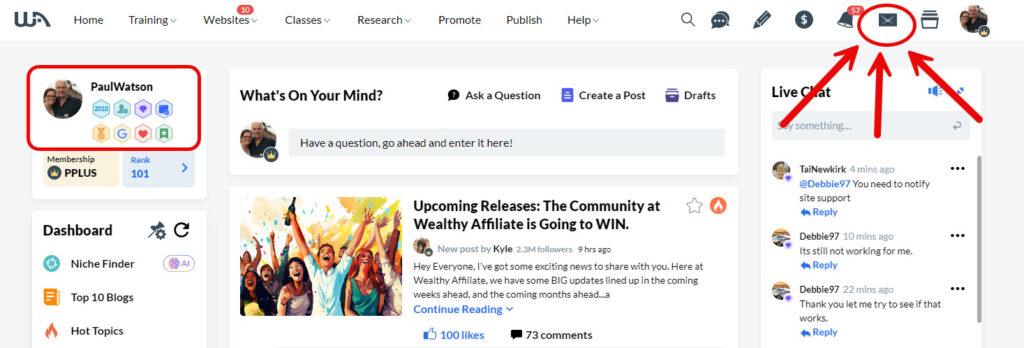Hey there Sea Changers and welcome back. Today we are going to tickle the taste buds as we discuss how to sell food online from home. I mean we all eat food right? And to that end we all need recipes, want to know how to cook certain foods or even decide to undertake different eating habits and diets (lifestyle and weight loss etc.).
Oh, and we might even want to buy actual foodstuffs too… So for those of you looking to make money selling food online from home, then let's see if this could be worthwhile looking into…
How do we get started?
As we probably already know, there are a real lot of avenues we can investigate when it comes to food… And although I am fairly confident that there is a market for this sort of thing, I would hate to get you started on the subject and then find out that no-one is interested in anything to do with food online… I mean I seriously doubt that is the case, but let's check it out anyway…
What are people looking for?
As we begin, let's just confirm our market numbers:
1. Number of monthly searches
As we are looking to see if there is an interest in buying food related products and services online (so we can sell them), our first check is for purchase related searches. You will need to find yourself a good keyword tool (I use Jaaxy) and enter in the keywords that best describe your market. In this case, let's start with the basics:

Ok, so I probably knew that the large number of monthly searches here would be the case – and we will definitely need to break this down a little – I did however just want to see what people were searching for when it comes to food. It looks to be all about the calories and nutrition which makes sense and opens up a quite a few possibilities already. Let's dig a little deeper:

72000+ searches… Again, big numbers for diet – which can be both as a lifestyle, for a purpose or in the traditional sense for weight loss. And just as a point of interest, the following searches were also popular (in searches per month):
- Weight loss diet: 4642
- Vegan diet: 8357
- Paleo diet: 32911
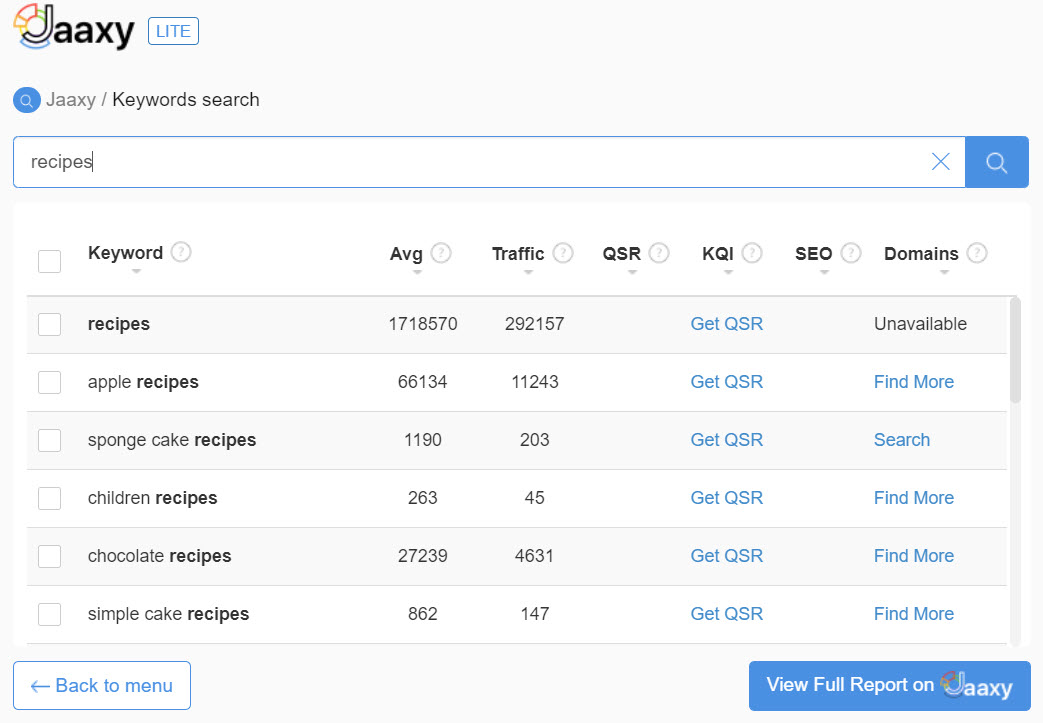
And finally I just wanted to check out if recipes were a factor here and I have to admit, I didn't expect those results. Those numbers are huge and make this a fantastic niche if you were looking to set up an online business to do with food. We will discuss niche breakdown soon however I think even from just those numbers above we are onto a good thing here…
2. Search Trends
Another important aspect of online sales and niche selection is to check that interest is maintained over time. To gain an insight into this let's check out how a few of our food related searches are trending online.

Ok, so we can see that interest has been maintained fairly well all year round over the past few years – i.e. no seasonal spikes. In fact, it even looks like interest in food in general has actually risen a little. Again, I think we can be assured of a solid base on which to start our online business.
That's right! Wealthy Affiliate provided me with all of the tools and training I needed to get this post in front of my audience - a.k.a YOU!
You too can start your very own online business here that can make you money from anywhere in the world!!
What is our niche?
Now the fun part begins… In the statistics and screen dumps above, we can already see that there is much interest in food in regards to diet and recipes however that does not mean you cannot make a decent online income working within other areas as well.
The decision you have now is to determine whether you wish to create your online business covering one of these subjects, or concentrate on another specific area or sub niche altogether. There are a good number of different areas you could explore here – and off the top of my head, some examples include:
- Food
- General
- Cultural
- Specific need
- Specific diet
- Special occasion
- Nutrition/supplements
- Recipes
- Cooking type – e.g. BBQ
- By Country
- Cooking appliances
- Kitchen protocols
- Chef related subjects
And that is just a few – all of which can be marketed from the point of view of the writer, or simply as a means of supplying information to those looking to purchase. As you start to think about this, the question to ask yourself is whether the content you are covering is too large to cover effectively.
The risk here is that if you start with a niche that is too broad, you may not be able to cover everything to the level required or to become authority on the subject – which you will need to be if you are going to convince people to purchase from you and not their local store. Don't forget, you can always add a new section to your site as you grow as well.
As you work through narrowing your targeted niche, consider the following:
- Are you able to solve a problem – Most people undertake searches on the internet to solve a problem – see next section.
- Is it a subject that you have an interest, or knowledge in– I am guessing that you are in this post as you know about, or have an interest in food, its preparation, uses or results. If you don't have any of these, maybe consider another market as to be honest, you might struggle to produce solid content if you don't know much about them – or worse, have no interest in food at all – apart from just eating it that is – you know what I mean. Trust me, people will know immediately if your information is not up to scratch or can put their safety, health or their love of a good steak (or eggplant) at risk.
Let's investigate this a little further by discussing the problem solving elements of niche selection.
[elementor-template id=”3325″]
What problem are we solving?
If this is a niche that you are interested in, you may already know what it is that you are trying to sell. If not, then maybe start to look at it from the perspective of solving problems. This, added to your area of interest is a great way to work out exactly what you think you might like to base your online business upon.
Think about your own search behaviours when you are online – I would hazard a guess that most searches you do are in order to solve a problem. Now think of these in a manner in which someone might have problems within food related niches such as:
- You know what you want to cut sugar from your diet but don't know how to start.
- You have a problem and need a solution – I.e. “I know I want to buy a food processor but don't know which one is best”.
Your goal here is to determine just what problem/s you are trying to solve for your readers. This may be one problem that spans your site or differ for each post that you write. For example, if you have chosen the Paleo diet as your niche, then problems might be:
- Matching products to use– They want to know foods they should and shouldn't consume with this diet.
- Which to buy – There are a number of dairy alternatives on the market – but which is best on a budget?
In these cases, people would be searching for those topics based on having a problem and needing a solution. Your food blog site would outline and review the best options for them.
Alternatively, if your site is about a particular cooking method – let's go with BBQ, then you would be addressing problems such as:
- What smokers are ‘best' for each purpose?
- Should you consider a particular brand of charcoal/wood?
- How should meats be prepared?
- Can you get them on a budget?
- What rubs suit each type of meat?
- How long should they be cooked for?
- What is the best meat to start with for beginners?
Note: You do not need to identify every possible problem that your readers may have straight away. In many cases, the more you write, the more ‘problems’ will present themselves so initially you really just want to make sure that there are some that may need solving as we have found here.

How are you going to convince them to buy?
Now that we know our niche (or are at least working on it) and have an idea of the types of problems that we want to solve, there is one last thing to consider which is the online purchase behaviour of your targeted audience.
The first thing you would need to consider is exactly who will be looking at your site. The first group that comes to mind are those who are looking for decent meal options on a budget for their families. Then there are the lifestyle dieters who have specific needs and lifestyle beliefs. And of course those who are looking for the best nutritional options for sport or medical reasons. Some examples include:
- Those that are purchasing for a specific need will want to know exactly what they are getting and are happy to pay for it however others may be looking for the same option but at a price a little gentler on the back pocket.
- Lifestyle dieters (Paleo, Vegan etc.) or those looking to lose weight with diet will want to know all about the latest options, updates and products available and may dissect your reviews with a fine toothed comb.
- If you are dealing with those just looking for a good recipe for their family – give them the information and let them get on with it.
- And finally don't forget those who are combining food with a hobby – they have potentially unlimited buying power as long as they have all the details.

So at the end of the day, even though we do have purchaser behaviour on our side, to be successful in selling food online, consider the following:
- Solve problems without purchase – That's right – write your posts in a way that actually makes it easier for people to do their research and buy elsewhere – by doing this, you are solving problems and helping readers out. If they trust you, they will be more likely to return next time and buy from you then – especially if you follow up with posts on similar or compatible recipes or preparation accessories that might interest them!
- Provide the intangibles – One major disadvantage when it comes to selling anything online is that we can’t really know what the products look, taste and feel like. And the same goes for terminology – after all, even harmless words such as ‘hot’ or ‘low fat’ can mean different things to different people. Your posts will need to cover this information in a manner that puts minds at ease and explains some of the intangibles.
- Know your audience – A big mistake many make here is to target the product and not necessarily the buyer. This is especially important when dealing with a budget minded audience. It is very easy for example to get carried away explaining how great a mix master is because it is cheap all the while forgetting that those intending to use it are doing so daily meaning it could wear out quite quickly. The same goes for high end options… Expensive doesn't always mean longer lasting or a better fit. Make sure you do your research on the buying behaviours of those you are targeting before writing your posts.
Tip: Still not sure? Have a look and see what others are doing. It might just help you with some ideas.
How do we sell food online?
And then we come to probably the most important aspect of this whole online selling caper in that we need to consider how we are going to sell the products that we have decided to promote. Depending on the product, there are a number of methods you can use to do this. Let's explore them below:
Affiliate marketing
Affiliate marketing, a common sales method for food bloggers, is the process of selling products via programs that are setup directly by companies or marketplace platforms (Amazon, Ebay etc.) that allow you to join and then refer traffic to them through customised affiliate links.
In short, this means that you will write about your chosen area within the food niche (in the spirit of solving problems as discussed above) and then refer your readers to a link where they will purchase directly from the vendors. The vendors then pay you a commission for the sale.
Affiliate programs are especially good for those selling food online as you can move seamlessly through changes to products, dietary advancements and the like without needing to sell out of previous stock first (or if you are selling actual foodstuffs you don't have to worry about it going ‘off'). This way you can promote/review the latest products and then refer your readers to the vendor to manage the sale without you having to hold inventory or organise shipping.
Finding affiliate programs is generally not a difficult task either. To locate them, you would normally just type “Affiliate: niche” into your preferred search engine. Below is an example for search results on general food affiliate programs:

And just to give you an example of what else is out there, let's check out affiliate program for the paleo diet:
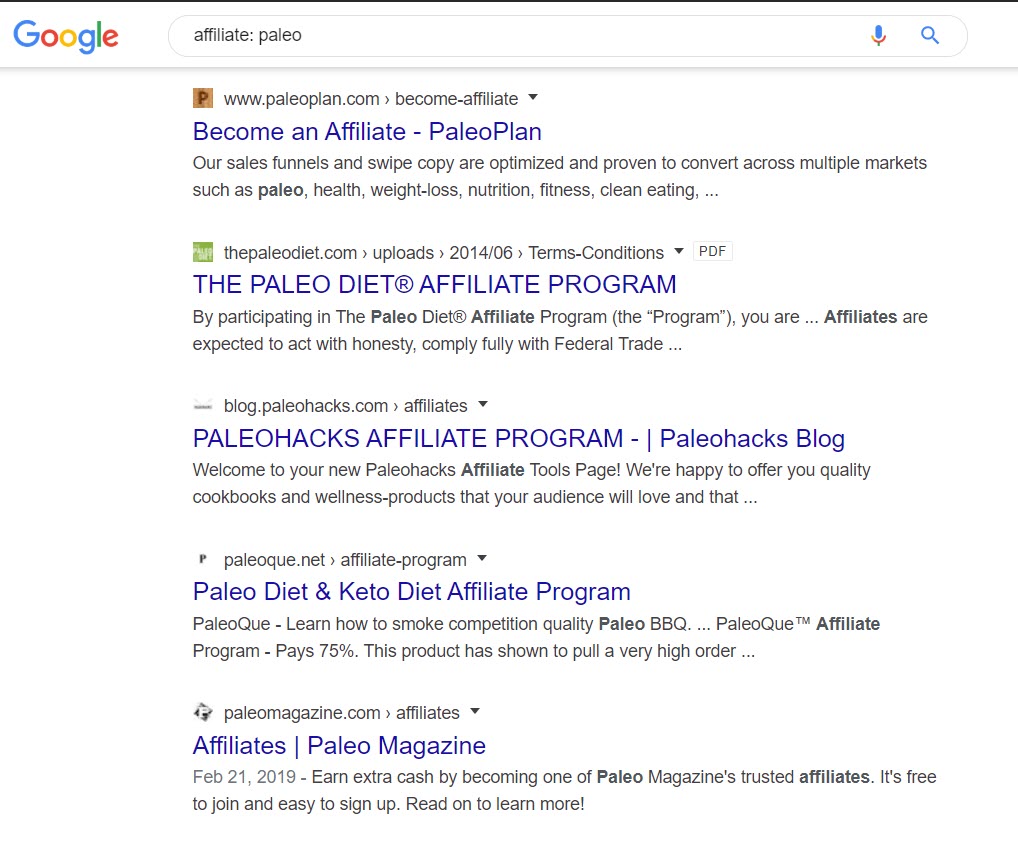
So, as you can see, there are plenty of options in regards to affiliate programs for food related niches. As you search through them all, you can check it all out and find programs that:
- Relate to your niche/problems that you are solving.
- Have quality products – your brand can be severely damaged if you promote poor quality or unsafe products.
- Have solid payment and customer service arrangements.
- Pay decent commissions.
- Have good testimonials covering commission payouts and quality of product.
- Whether they have high ticket items you can promote on the side.
In most cases, you will need to apply for the program before you are allowed to promote their products – don’t take this step lightly or you will be rejected. Affiliate programs will generally want to know:
- Your website name.
- Traffic levels.
- Why you want to join – (“so I can make money by selling your vegan cookbooks online” is unfortunately not generally a good enough answer).
- How you plan to promote their products.
One thing to be aware of here I guess is to keep in mind the issues we discussed earlier in regards to selling food related products online. You need to make sure that the programs you choose can be trusted and that the consumer is comfortable that they have recourse if something goes wrong.
For this reason you will need to make sure that your chosen programs are going to resonate with your readers and your niche. That said, some marketplace programs such as Amazon and EBay can give you access to these types of products and as they are more trusted, then they maybe worth a look as well.
Multi-level marketing
Multi-level marketing (MLM) programs are the mainstay of the ‘party plan' world of products such as Tupperware, Mary Kay and Amway etc. and are also popular within the food industry companies. If you use them in their basic capacity, MLM programs mirror affiliate marketing programs in that you make a commission on every sale that you refer to them.
It is however the secondary aspect of these programs – and where the multi-level influences come from – that can really boost your revenue earning capabilities. The process works as follows:
- You attract a visitor to your site and convert them to the sales page
- They are offered an incentive to sign up as a member of the program (there are different names for this but they all mean the same thing).
- That new member is then placed ‘underneath' you in a hierarchical arrangement
- You then gain extra commissions for everything they sell as well.
Within the food industry, the most commonly targeted area in the network marketing space is to do with nutrition and supplements however there are a few others (Juice + and Vida Divina for example) that sell food products such as juice, tea, coffee and even wine.
One final consideration to be aware of here however is that most MLM arrangements require a minimum sales total to be met per month in order to qualify for commissions – for example, Total Life Changes expect you to generate sales of roughly USD $50 per month in order to earn commissions. This can make things a little tight if your site is new and not making any money as yet.
Sell your own
If affiliate marketing or MLM are not something you are interested in how to sell meals online, maybe you could try sourcing and selling your own products. This is especially popular within this niche as there is just so much variation in sub niche options that you really could do just about anything such as:
- Write cookbooks/recipes
- Make product (such as preserves or jerky etc.)
- Create ingredient packs (such as all the spices for a curry etc.)
The sky really is the limit here. Alternatively, if you were looking at a business such as restaurant or cafe supply etc. then you could even sell brandless products as your own (often referred to as whitelabelling). Here you actually purchase your product from a vendor or wholesaler, add your own label and then on-sell them via your website or platforms such as Amazon.
This process requires much higher setup costs as you will need to create or purchase your products, affix your labels and manage orders and shipment. Some wholesalers/vendors however will affix the labels that you send them and then manage the packaging and shipment for you. This will cost you less to set up but obviously you will make less on the sale once they take their processing fee.
To find out where to acquire your product, you can undertake an online search such as “white label: foods”:
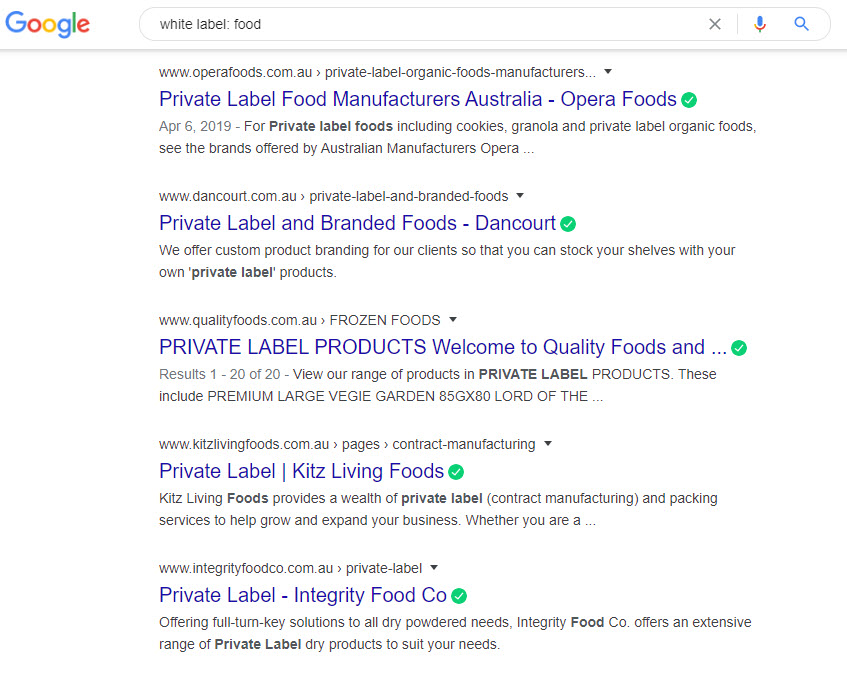
Or if you are looking at the supply side of things then a search on wholesale foods might work as well:
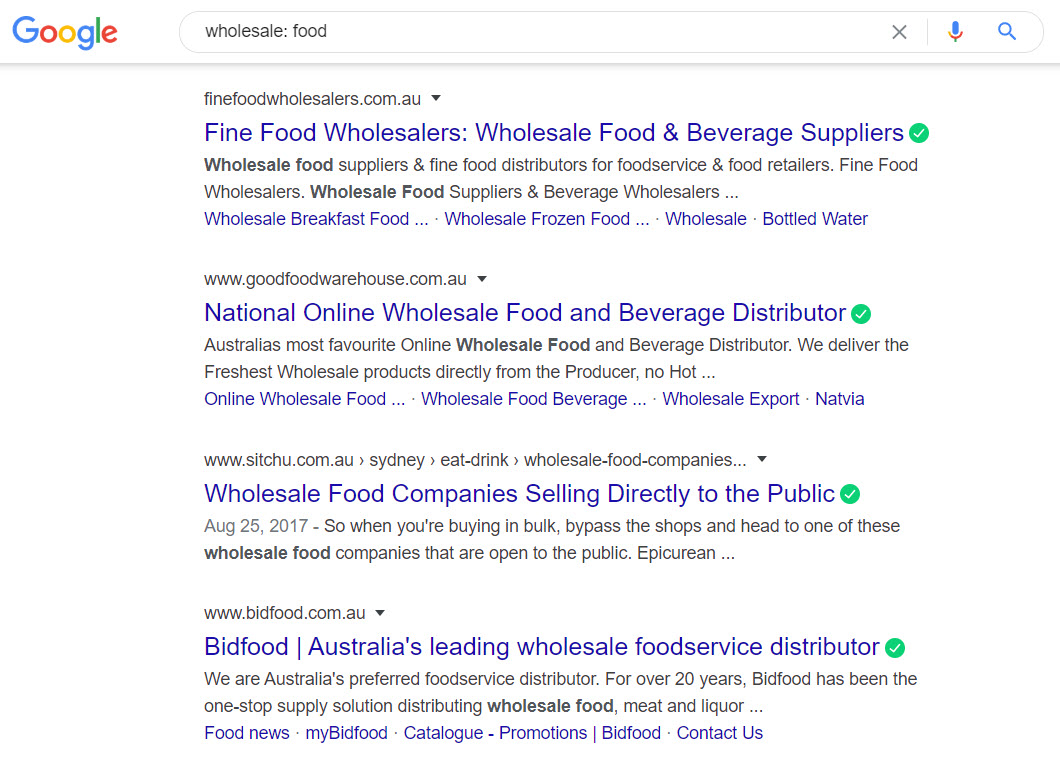
Note: These results will usually be based on your geographical location so you may at times need to sort through a few pages.
From here you will need to follow the same processes as with affiliate programs in determining whether they are a good fit for your business plans including:
- Relate to your niche/problems that you are solving.
- Have solid delivery and customer service arrangements.
- Have good testimonials covering service and quality of product.
Alternatively, keep your eye out in your local area for exhibitions, food festivals or industry shows. These are a great way to find and purchase your products at good prices – you never know, you might even find a solid supplier for future sales as well.
Tip: This method can be very effective in driving online traffic and sales via the implementation of more traditional sales methods such as kiosks and market stalls etc. As people get to know you, they can purchase from you there and then be directed to your website for future sales.
Other Options
Alternatively, if you have some real skills in this area, then you may be able to look at some other ways to make some good cash online with food. These can include:
Offer a Service – This is where you perform a task that assists those within this niche such as:
- Cooking – either by doing it yourself or teaching others to do it.
- Food Packages – make up packages for those selling at markets etc.
These services can be offered in person or demonstrated online via an online course or on YouTube.
Build your own and sell – if you are more on the handy side, then make your own products and on sell them. This could be absolutely anything such as specialist food preparation tools or surfaces (cutting boards, preparation benches etc.), parts and consumables or chemical free cleaning solutions for kitchens/cooking areas for example. Items can be made and then sold via a website or marketplace platform such as Amazon or Shopify.

What do we need to do?
Once we have all of the above sorted, or at the very least a plan in place, we need to choose and setup the media that we intend to use to sell our product. This can include:
Build a Website
If you are looking to build your online business as an affiliate marketer, supplier or even via MLM then chances are you will most probably need a website. Websites allow you to solve problems via blog posts and videos that people can view in order to identify the solutions that they need.
Usually, this process is fairly straight forward in that you build your website, write posts (on the differences between certain types of herbs for Italian food for example), then provide links so that your readers can view/purchase the relevant materials from your links.
That's right! Wealthy Affiliate provided me with all of the tools and training I needed to get this post in front of my audience - a.k.a YOU!
You too can start your very own online business here that can make you money from anywhere in the world!!
Promote on Social Media
When it comes to food, there is probably no more powerful tool than Social media. It has the power to reach thousands and allows you to target specific segments if you choose the correct platform. In terms of food related products online, a good platform to start with is FaceBook where you can discuss items with your audience, display products in use and show videos.
However, if you are looking to set yourself up as an expert within the niche, then programs such as Instagram, YouTube or Pinterest will be your go to option. This is great for visuals such as pictures and/or videos showing you working with, preparing, cooking, presenting or serving food, cleaning or maintaining kitchen areas as well as installing and using the consumables/accessories that you are discussing within your posts.
And, if you are able to build a following you may even get noticed and be paid gazillions to use certain brand within your pics and videos – this takes time, but it does happen…
Join like-minded groups
Anther great tool when it comes to selling products online are social groups. By getting involved with these groups you can really get a great understanding as to what its members are struggling with, what information they seek and what products they are looking to buy. Below is an example of some food related FaceBook groups:


Note: Many of these groups will not allow you to spruike or promote your sites directly, however if you can interact and demonstrate your knowledge then people will ask you directly for the information. At the very least, as above, it is a great way to get ideas and insight into what people in this area really want to know about and what they are buying online.
Conclusion
And there it is – How to make money selling food online. I hope it has been helpful and as usual, please do not hesitate to comment below if you have any questions, need some advice or have any experiences to share.
Do you want further assistance with any of the above or need help to build your own food related website?
Are you looking for a comprehensive training platform that can give you step by step training, 24/7 support, tools to develop and host your very own website, ongoing assistance with SEO and social media and access to some of the best affiliate marketing minds on the planet, then click on the following link to read more about Wealthy Affiliate.
Until next time
Have fun
Paul
Note: If you make a purchase from this page, there is a very good chance that I make a commission from it – these commissions do not increase your sale price. This may include sales made via Wealthy Affiliate.






